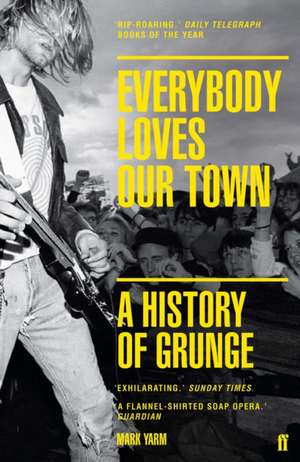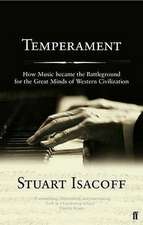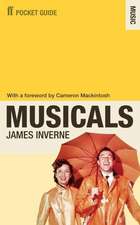Everybody Loves Our Town
Autor Mark Yarmen Limba Engleză Paperback – 7 sep 2017
| Toate formatele și edițiile | Preț | Express |
|---|---|---|
| Paperback (2) | 84.55 lei 3-5 săpt. | +18.98 lei 4-10 zile |
| FABER & FABER – 7 sep 2017 | 84.55 lei 3-5 săpt. | +18.98 lei 4-10 zile |
| Three Rivers Press (CA) – 29 feb 2012 | 125.40 lei 3-5 săpt. |
Preț: 84.55 lei
Nou
Puncte Express: 127
Preț estimativ în valută:
16.18€ • 16.83$ • 13.36£
16.18€ • 16.83$ • 13.36£
Carte disponibilă
Livrare economică 25 martie-08 aprilie
Livrare express 08-14 martie pentru 28.97 lei
Preluare comenzi: 021 569.72.76
Specificații
ISBN-13: 9780571249879
ISBN-10: 0571249876
Pagini: 608
Dimensiuni: 126 x 198 x 43 mm
Greutate: 0.46 kg
Ediția:Main
Editura: FABER & FABER
ISBN-10: 0571249876
Pagini: 608
Dimensiuni: 126 x 198 x 43 mm
Greutate: 0.46 kg
Ediția:Main
Editura: FABER & FABER
Recenzii
“Yarm’s affectionate, gossipy, detailed look at the highs and lows of the contemporary Seattle music scene is one of the most essential rock
books of recent years.”
—Kirkus Review, *Starred Review*
“Hardcore fans of grunge will treasure this.”
—Publishers Weekly
“Yarm, a former editor of Blender, interviewed more than 250 musicians, scenesters, and record business types
to deliver a personal, comprehensive history of grunge music…Highly recommended.”
—Library Journal
"Mark Yarm has assembled the gospels of Grunge music. Here is a warts-and-elbows refresher course for those of us who still find our memories of the era a little hazy."
─Chuck Palahniuk, author of Fight Club
"A very noble record of the grunge scene—and an excellent addition to the growing library of oral history music books."
—Legs McNeil, coauthor of Please Kill Me: The Uncensored Oral History of Punk and the forthcoming Resident Punk
"Great oral histories are rare. Hewing a narrative from all those chaotic and often conflicting memories with testimony alone and no guide-prose or stage direction is difficult. Making that somehow intimate and epic is nearly impossible. When a writer pulls it off, as Mark has with Everybody Loves Our Town, it's really a gift: the subject or scene finally gets its definitive record and the reader gains what feels like a room full of brand new friends. One of the best rock reads in a very long time."
─Marc Spitz (co-author We Got The Neutron Bomb: The Untold Story of LA Punk, music blogger VanityFair.com).
"In Everybody Loves Our Town, Mark Yarm collects and dispenses remarkable insights about a genre no one even wants to claim as their own. As a child of grunge ߝ who spent a humiliating chunk of the 1990s in an Alice in Chains t-shirt ߝ I loved this book; it clarified so many things about a sound and a time I thought I already knew."
─Amanda Petrusich, author of It Still Moves: Lost Songs, Lost Highways, and the Search for the Next American Music
"A deeply funny story, as well as a deeply sad story--the glorious Nineties moment when a bunch of punk rock bands from Seattle accidentally blew up into the world’s biggest noise. Mark Yarm gives the definitive chronicle of how it all happened, and how it ended too soon. But the book also makes you appreciate how weird it is that this moment happened at all."
─Rob Sheffield, author of Love Is A Mix Tape and Talking To Girls About Duran Duran
"A definitive, irreplaceable chronicle of one of rock-n-roll's greatest eras. It should sit tall on any rock lover's bookshelf."
─Neal Pollack, author of Never Mind The Pollacks
“In an attempt to trace the real roots of grunge, journalist Mark Yarm compiled an exhaustive oral history from the people who lived it. In his book Everybody Loves Our Town, there are interviews with everyone from the early adopters to those that were late to the party, but nevertheless helped extend [grunge's] shadow of influence by turning it into a look for the world to emulate.”
—The Fader
“This massively readable tome gathers recollections from every grunge band you’ve ever heard of (Pearl Jam, Nirvana, Soundgarden, Melvins) and some you haven’t (we hardly knew ye, Skin Yard)…The genre’s first truly comprehensive insider history…It’s gossipy…and fascinating, with so much backstabbing and death it’s like Shakespeare, if Shakespeare had written about heroin addicts with bad hair.”
—Revolver (4 out of 4 stars)
“An impressive display of reportorial industriousness… It’s the feel-bad rock book of the fall.”—Bloomberg Businessweek
“Oral history is an art in itself. It’s why Everybody Loves Our Town will endure as a classic of monumental scale.”—Paste Magazine.
“For hardcore fans or people just curious about what the fuss was all about, Mark Yarm’s excellent new book ߝEverybody Loves Our Town: An Oral History of Grunge” is well worth the read. Yarm has done an admirable job of assembling an engaging, funny and ultimately sad narrative by letting the people who helped create the Jet City sound talk about what happened in their own words.—Seattle Post-Intelligencer
“Yarm’s account captures the essential tension that made the era so compelling.”—Greg Kot, Chicago Tribune
"We finished all five hundred and forty-two pages of this book in two days, abandoning all responsibility (this, friends, is why we do not have children; had there been any children about us, we would have locked these unfortunate creatures in the bathroom, so as to not be
distracted) and staying up until two in the morning, reading whole chunks of it out loud to poor long-suffering Support Team."--TheRejectionist.com
Mark Yarm's superb book, Everybody Loves Our Town: A History of Grunge details the dramatic rise of the grunge movement and all of its players, including Cobain, Love and Vedder, told through the voices of the people that lived through it.--Hollywood Reporter
“I came away from this book with a big smile on my face. Lots of it is like a gray day in western Washington; you’ve been kicked out of yet another band, and your girlfriend is spending far too much time with the drummer from the Melvins or the Screaming Trees. In the end, though, “Everybody Loves Our Town" made me want to be young, stupid and lucky again. Mainly, it made me want to be young.”--The Washington Post
“Everybody Loves Our Town should inspire new conversations about the unique culture and people that made grunge so unusual and unforgettable to so many fans. The book is timely, as 2011 marks the 20-year anniversary of Nirvana’s “Nevermind” and Pearl Jam’s multi-platinum debut album, “Ten.” Everybody Loves Our Town is as good an excuse as any to put on an Alice in Chains CD and curl up with a good book about some great old friends with whom we haven’t spent much time in a while.”--The Washington Independent Review of Books
“Everybody Loves Our Town is authoritatively researched and compiled, often very funny and always just a little bit sad.”—Buffalo News
"Like a very extended and entertaining all-night bulls--- session among everyone who mattered during the late-'80s/early-'90s music scene."--Seattle Weekly
"The scope is encyclopaedic and the closeness to the subject unparalleled."--Record Collector
"A wild ride that is in turns uplifting and tragic." --Your Flesh
Named one of the top music books of 2011 by UK Telegraph
"Riveting, gossipy, and impossible to put down until the last quote has been read." --New York magazine's Vulture blog
“This exhaustive oral history features unknowns, cult figures, supporting players and stars; each gets the time he or she deserves as Yarm pieces together the arc of a scene that built itself from scratch, blossomed beyond most people's dreams, and then crashed. Yes, there are plenty of Kurt Cobain stories. But there's much more, too — indelible characters, weird scenes, creative chaos, laughs and tragedy and lots of cheap beer.”—NPR.org
"Gen-X music geeks: Here’s your holy grail." --Tulsa World
"The best book on music I've read this year." --Omaha World-Herald
“This volume could have been a huge, snarky compendium of gossip and score settling from the inhabitants of a claustrophobically insular local music scene. And it is, but in the best possible way—and it’s also much, much more…. Yarm has culled the story of grunge from the people who created it, and their testimony is remarkable for its eloquence and its passion and its fairness and its anger.” —Lev Grossman, Time (named one of the magazine's Top 10 nonfiction books of 2011)
“A Herculean work of interviewing and editing which gives everyone a voice, from the biggest stars to the lowliest foot soldiers… . Though the Seattle scene’s stew of folly, feuding, rampant drug addiction and a startling number of fatalities might have made for a voyeuristic tale, Yarm leaves the reader full of empathy for young men and women swept up in a cultural moment they couldn’t control.” —The Guardian (named a best music book of the year)
“Exhilarating … Mark Yarm’s brilliant and exhaustive oral history of grunge is full of … vivid observations. Some 250 interviews with those intimately associated with the most unlikely musical sensation of all time piece together a story that is hilarious and tragic and utterly gripping.” —Sunday Times of London
A Gawker.com Best Thing We Read All Year selection
“[A] lively, funny, melancholy and exhaustive oral history … For all its eventual compromise and dissolution, Seattle was briefly an exhilarating pop cultural moment to rank with the greats. Yarm’s labour of love has well and truly done it justice.” —Time Out London
“If you loved the ’90s and you haven’t read this book, you MUST. I’m absolutely obsessed with Mark Yarm’s masterpiece right now.” —USAToday.com’s Pop Candy column
"Full of so many entertaining stories and thrilling anecdotes that we have read it cover-to-cover TWICE. You should do the same!" —VH1.com
“The definitive oral history of the Seattle music scene, period.” —Alternative Press
books of recent years.”
—Kirkus Review, *Starred Review*
“Hardcore fans of grunge will treasure this.”
—Publishers Weekly
“Yarm, a former editor of Blender, interviewed more than 250 musicians, scenesters, and record business types
to deliver a personal, comprehensive history of grunge music…Highly recommended.”
—Library Journal
"Mark Yarm has assembled the gospels of Grunge music. Here is a warts-and-elbows refresher course for those of us who still find our memories of the era a little hazy."
─Chuck Palahniuk, author of Fight Club
"A very noble record of the grunge scene—and an excellent addition to the growing library of oral history music books."
—Legs McNeil, coauthor of Please Kill Me: The Uncensored Oral History of Punk and the forthcoming Resident Punk
"Great oral histories are rare. Hewing a narrative from all those chaotic and often conflicting memories with testimony alone and no guide-prose or stage direction is difficult. Making that somehow intimate and epic is nearly impossible. When a writer pulls it off, as Mark has with Everybody Loves Our Town, it's really a gift: the subject or scene finally gets its definitive record and the reader gains what feels like a room full of brand new friends. One of the best rock reads in a very long time."
─Marc Spitz (co-author We Got The Neutron Bomb: The Untold Story of LA Punk, music blogger VanityFair.com).
"In Everybody Loves Our Town, Mark Yarm collects and dispenses remarkable insights about a genre no one even wants to claim as their own. As a child of grunge ߝ who spent a humiliating chunk of the 1990s in an Alice in Chains t-shirt ߝ I loved this book; it clarified so many things about a sound and a time I thought I already knew."
─Amanda Petrusich, author of It Still Moves: Lost Songs, Lost Highways, and the Search for the Next American Music
"A deeply funny story, as well as a deeply sad story--the glorious Nineties moment when a bunch of punk rock bands from Seattle accidentally blew up into the world’s biggest noise. Mark Yarm gives the definitive chronicle of how it all happened, and how it ended too soon. But the book also makes you appreciate how weird it is that this moment happened at all."
─Rob Sheffield, author of Love Is A Mix Tape and Talking To Girls About Duran Duran
"A definitive, irreplaceable chronicle of one of rock-n-roll's greatest eras. It should sit tall on any rock lover's bookshelf."
─Neal Pollack, author of Never Mind The Pollacks
“In an attempt to trace the real roots of grunge, journalist Mark Yarm compiled an exhaustive oral history from the people who lived it. In his book Everybody Loves Our Town, there are interviews with everyone from the early adopters to those that were late to the party, but nevertheless helped extend [grunge's] shadow of influence by turning it into a look for the world to emulate.”
—The Fader
“This massively readable tome gathers recollections from every grunge band you’ve ever heard of (Pearl Jam, Nirvana, Soundgarden, Melvins) and some you haven’t (we hardly knew ye, Skin Yard)…The genre’s first truly comprehensive insider history…It’s gossipy…and fascinating, with so much backstabbing and death it’s like Shakespeare, if Shakespeare had written about heroin addicts with bad hair.”
—Revolver (4 out of 4 stars)
“An impressive display of reportorial industriousness… It’s the feel-bad rock book of the fall.”—Bloomberg Businessweek
“Oral history is an art in itself. It’s why Everybody Loves Our Town will endure as a classic of monumental scale.”—Paste Magazine.
“For hardcore fans or people just curious about what the fuss was all about, Mark Yarm’s excellent new book ߝEverybody Loves Our Town: An Oral History of Grunge” is well worth the read. Yarm has done an admirable job of assembling an engaging, funny and ultimately sad narrative by letting the people who helped create the Jet City sound talk about what happened in their own words.—Seattle Post-Intelligencer
“Yarm’s account captures the essential tension that made the era so compelling.”—Greg Kot, Chicago Tribune
"We finished all five hundred and forty-two pages of this book in two days, abandoning all responsibility (this, friends, is why we do not have children; had there been any children about us, we would have locked these unfortunate creatures in the bathroom, so as to not be
distracted) and staying up until two in the morning, reading whole chunks of it out loud to poor long-suffering Support Team."--TheRejectionist.com
Mark Yarm's superb book, Everybody Loves Our Town: A History of Grunge details the dramatic rise of the grunge movement and all of its players, including Cobain, Love and Vedder, told through the voices of the people that lived through it.--Hollywood Reporter
“I came away from this book with a big smile on my face. Lots of it is like a gray day in western Washington; you’ve been kicked out of yet another band, and your girlfriend is spending far too much time with the drummer from the Melvins or the Screaming Trees. In the end, though, “Everybody Loves Our Town" made me want to be young, stupid and lucky again. Mainly, it made me want to be young.”--The Washington Post
“Everybody Loves Our Town should inspire new conversations about the unique culture and people that made grunge so unusual and unforgettable to so many fans. The book is timely, as 2011 marks the 20-year anniversary of Nirvana’s “Nevermind” and Pearl Jam’s multi-platinum debut album, “Ten.” Everybody Loves Our Town is as good an excuse as any to put on an Alice in Chains CD and curl up with a good book about some great old friends with whom we haven’t spent much time in a while.”--The Washington Independent Review of Books
“Everybody Loves Our Town is authoritatively researched and compiled, often very funny and always just a little bit sad.”—Buffalo News
"Like a very extended and entertaining all-night bulls--- session among everyone who mattered during the late-'80s/early-'90s music scene."--Seattle Weekly
"The scope is encyclopaedic and the closeness to the subject unparalleled."--Record Collector
"A wild ride that is in turns uplifting and tragic." --Your Flesh
Named one of the top music books of 2011 by UK Telegraph
"Riveting, gossipy, and impossible to put down until the last quote has been read." --New York magazine's Vulture blog
“This exhaustive oral history features unknowns, cult figures, supporting players and stars; each gets the time he or she deserves as Yarm pieces together the arc of a scene that built itself from scratch, blossomed beyond most people's dreams, and then crashed. Yes, there are plenty of Kurt Cobain stories. But there's much more, too — indelible characters, weird scenes, creative chaos, laughs and tragedy and lots of cheap beer.”—NPR.org
"Gen-X music geeks: Here’s your holy grail." --Tulsa World
"The best book on music I've read this year." --Omaha World-Herald
“This volume could have been a huge, snarky compendium of gossip and score settling from the inhabitants of a claustrophobically insular local music scene. And it is, but in the best possible way—and it’s also much, much more…. Yarm has culled the story of grunge from the people who created it, and their testimony is remarkable for its eloquence and its passion and its fairness and its anger.” —Lev Grossman, Time (named one of the magazine's Top 10 nonfiction books of 2011)
“A Herculean work of interviewing and editing which gives everyone a voice, from the biggest stars to the lowliest foot soldiers… . Though the Seattle scene’s stew of folly, feuding, rampant drug addiction and a startling number of fatalities might have made for a voyeuristic tale, Yarm leaves the reader full of empathy for young men and women swept up in a cultural moment they couldn’t control.” —The Guardian (named a best music book of the year)
“Exhilarating … Mark Yarm’s brilliant and exhaustive oral history of grunge is full of … vivid observations. Some 250 interviews with those intimately associated with the most unlikely musical sensation of all time piece together a story that is hilarious and tragic and utterly gripping.” —Sunday Times of London
A Gawker.com Best Thing We Read All Year selection
“[A] lively, funny, melancholy and exhaustive oral history … For all its eventual compromise and dissolution, Seattle was briefly an exhilarating pop cultural moment to rank with the greats. Yarm’s labour of love has well and truly done it justice.” —Time Out London
“If you loved the ’90s and you haven’t read this book, you MUST. I’m absolutely obsessed with Mark Yarm’s masterpiece right now.” —USAToday.com’s Pop Candy column
"Full of so many entertaining stories and thrilling anecdotes that we have read it cover-to-cover TWICE. You should do the same!" —VH1.com
“The definitive oral history of the Seattle music scene, period.” —Alternative Press
Notă biografică
MARK YARM is a former senior editor at Blender magazine. He lives in Brooklyn with his wife, Bonnie, and is in no way related to Mudhoney frontman Mark Arm.
From the Hardcover edition.
From the Hardcover edition.
Extras
Chapter 1
LARRY REID (U-Men manager; co-owner of Roscoe Louie/Graven Image galleries; Tracey Rowland's husband) This was Labor Day weekend of 1985. Here's how I remember it. The U-Men's roadie, Mike Tucker, thinks it was my idea; I think it was Charlie Ryan's idea. And it's not that I don't want to take credit for it, because it was brilliant. But I'm sure it was Charlie's idea because Charlie had a fetish for Zippo lighters.
MIKE TUCKER (U-Men roadie) The idea, I do believe, was born out of a conversation between Larry and me. I remember going with Larry and getting the lighter fluid, which someone poured into Mickey's brand malt-liquor bottles.
JIM TILLMAN (U-Men/Love Battery bassist) I'm fairly positive it was John's idea. Suffice it to say that we all thought it was brilliant.
CHARLIE RYAN (U-Men/Cat Butt/the Crows drummer) It was my idea. I collected lighters. I was the firebug. I was the pyro. My idea!
LARRY REID The U-Men were the first real punk band ever booked at the Bumbershoot Festival. I managed to sell them as a performance-art combo. God bless 'em, the producers trusted me, and they shouldn't have-and never did after this!
CHARLIE RYAN Larry says, "We're on Bumbershoot." And we're like, "Oh, my God. Okay. This is going to be the ultimate showcase for us." I start thinking about the fact that there's the moat, this body of water in front of the stage. I wondered, Could we light it on fire?
LARRY REID Nobody was quite sure it would work, so we filled up my bathtub, poured some lighter fluid on it, and...
CHARLIE RYAN We took a match and threw it in, and it went boom! Flames.
LARRY REID There was a curtain on the window above the bathtub and it fucking went up, man. If we would've thought about it, we probably would've tried it outside using a bucket of water. The alarm went off, all hell broke loose-they had to empty the building, but it didn't catch the apartment on fire. We were all high-fiving each other, and like, "Yes, this was a good thing. This is gonna work!"
So skip to the gig, a couple weeks later. Bumbershoot was held at an outdoor venue called the Mural Amphitheatre, which is on the grounds of this large city-owned property called the Seattle Center. There were hundreds of people in the audience because it was free.
KURT BLOCH (Fastbacks/Young Fresh Fellows guitarist) I was right there in the front. They're setting up and everybody's like, "Something crazy's gonna happen, something crazy's gonna happen."
KERRI HARROP (Sub Pop Records sales and retail employee) I can even remember what I was wearing, the show was that significant. First of all, Bumbershoot's this family-friendly event-it's out on the open lawn in the shadow of the Space Needle-and you have these complete weirdos out on this stage.
CHARLIE RYAN It's sunny and nice out, and we're all in black leather and top hats and dark shades and being as menacing as we could be. Our freak show only appeared at night, in dark places, but here we are, in broad daylight. My mom was there-the end of the show wasn't her proudest moment.
LARRY REID At the end of the set, the sun was just going down. Mike Tucker and myself walked out to the edge of the stage, and we're each pouring what appeared to be a gallon of vodka into the pond. And Bigley comes out-they're doing this song called "They," which at that point was the standard last song.
JIM TILLMAN The last song was "Green Trumpet," though I could be wrong. There were 2,000 or 3,000 people there. A couple of our friends, this guy Mike, who was sort of a roadie, and this other guy Tommy Bonehead-his real name was Tom Simpson, but he was called Bonehead because it didn't matter how hard you'd hit him, he'd always fight-are pouring lighter fluid on either side of the stage.
TOM PRICE (U-Men/Cat Butt/Gas Huffer guitarist) We were playing a song called "10 After 1." And John ducked behind an amp, because we didn't want the authorities to see what was going on.
JOHN BIGLEY (U-Men/the Crows singer) I had gotten a broom and cut off the bristles, so it was just a nub where the bristles joined the handle, and wrapped it in a T-shirt soaked in lighter fluid. I ran back behind the drums, lit the broom with my lighter, and waited until the song "They" kicked into gear.
CHARLIE RYAN And John comes out, doing this insane tribal voodoo dance with a lit broom, menacing the crowd. And then he chucks it into the water.
MIKE TUCKER When John dipped his torch into the moat, it didn't immediately ignite. It was like, "Oh, fuck, it didn't work." The second time he dipped it in, suddenly this wall of fire went up.
JOHN BIGLEY I throw the broom in and there was a giant fireball, 20 to 30 feet high, easy. It was gigantic and it made a sound, this whoosh of oxygen.
LARRY REID The pond fuckin' exploded, man! I mean, it made the bathroom look like child's play. It went up, oh, 10, 12, 15 feet.
JOE NEWTON (Gas Huffer drummer) My recollection was that it was over in the blink of an eye. It burned fast, it burned hugely high and bright, but it just lasted a second. I knew they were going to do it, and it was like, "That's it?" Other people totally remember it being this huge wall of fire.
DENNIS R. WHITE (Pravda Productions partner; Desperate Times zine cofounder) In a lot of cases, people remember things being much bigger than they were. In this case, they don't. It looked like the band was engulfed in flames.
JOHN BIGLEY And with the supercharged rock-and-roll music, that's when the vast majority of the folks started jumping around and dancing. It was a crazy primal deal.
JAMES BURDYSHAW (Cat Butt guitarist; 64 Spiders guitarist/singer) The U-Men were into bones and skulls and black clothes and witch-doctor sort of imagery. The whole voodoo tribal thing became real 'cause the sun went down right when the flames happened. You felt like there was something dangerous going on but you couldn't look away. The crowd was screaming, but it wasn't out of fear. It was like, Yes! Yes! It was elation.
It was like, Fuck the Man, we're the most dangerous voodoo band-and we're gonna do a human sacrifice next. It felt like that was gonna happen.
LARRY REID It was perfect, except we'd failed to take into consideration that the stage was built out over the pond. There was creosote and tar underneath the stage, so there was just black smoke billowing long after the flames had died down. And the soundman freaked out, thinking the stage was on fire, and he's running up, trying to get his sound equipment off the stage. The audience is now going apeshit crazy. Cops being cops, they started wading into the audience and beating people with their billy clubs!
CHARLES PETERSON (photographer) The thing I remember most is that we all just went fuckin' bonkers, and started slam-dancing into each other. And there were these Seattle Center security guards who thought we were getting into fights and were trying to separate us. This 60- year-old security guard was just freaking out, and some of us were like, "Dude, they're just dancing!" I recall somebody grabbed a security guard's hat and danced around. It was mayhem.
JOHN BIGLEY We finished the song, definitely. Someone, it might have been Larry, grabbed me and threw me towards the drums: "Get the fuck out! Load the shit!" It was very chaotic-people running and screaming and kids holding their eyes and arrests and that whole thing.
TRACEY ROWLAND (co-owner of Roscoe Louie/Graven Image galleries; Larry Reid's wife) Norman Langill, who was running Bumbershoot, was yelling and screaming and freaking out and jumping up and down. He was furious.
JIM TILLMAN I'd parked our tour bus-it was a 1960s Chevy city school bus that said tacoma hillbillies on the side, though I have absolutely no idea why-in this spot next to the stage.
JOHN BIGLEY "Load the shit, load the shit!" We got loaded up and drove off before the police had gotten their act together to approach us.
CHARLIE RYAN I'll never forget driving our bus out of the Seattle Center grounds-all of these nice, normal people looking up at us, these freaks in a school bus who had just set the moat on fire.
KERRI HARROP I was blown away by the audacity of it. I'm sure if there was a panoramic shot of the crowd, virtually everyone who ended up in a band or who was in a band at the time was at that show. I think that if you were in a band and you saw that, it made you step up your game.
MARK ARM (né Mark McLaughlin; Mudhoney singer/guitarist; Green River singer; Mr. Epp and the Calculations guitarist/singer; the Thrown Ups drummer) I don't know if it was necessarily the best U-Men show I ever saw, but that was the coolest event at a U-Men show. They really made something happen.
LARRY REID The U-Men were banned from Bumbershoot, and I wasn't the most popular guy around there for a while. The year after that, they started draining the pond. And now they've filled it in with cement.
The day after the show, I met the Everly Brothers at the hotel and brought them to the venue-I was working at Bumbershoot, operating as an informal chaperone for the bigger acts-and the first person I ran into was Norm Langill, the producer of the festival. He just came unglued. He said, "What are you trying to do to me?!"
Phil Everly was really kinda sweet and came to my defense. He told this great anecdote, which was possibly apocryphal, about a show they had played with Jerry Lee Lewis. Jerry Lee was squirting lighter fluid on the 88s and pounding out "Great Balls of Fire." And the next thing you know...accidents happen. Apparently Jerry Lee was dancing on the piano, which was an impromptu addition to his normal routine, and caught his pants on fire.
That story got me off the hook. That calmed everything down, because Norm held the Everly Brothers in real high regard. Phil told him, "Leave the kid alone. That's rock and roll."
. . .
TOM PRICE The U-Men started in late '81. My family had moved to Seattle in 1965. I started playing music, believe it or not, mostly through the church. They called it "guitar mass"-it was the acoustic- guitar-strumming, long-haired Christians. Very Jesus Christ Superstar. In my early teens, my older brother was turning me on to all this weird music, like Captain Beefheart and Lou Reed. And so when punk came along, that was a natural jump. The U-Men was probably my first band that made any records.
Me and Charlie had both dropped out of high school together and moved into a crash pad in the University District. Charlie was a really funny character. He's an Irishman, his dad was a bookie, and he had his own apartment downtown, just this whole weird style that was pretty unfamiliar to kids like me from tree-lined residential neighborhoods.
CHARLIE RYAN I was born and raised in Seattle, and grew up pretty much downtown. Bookmaking was the family business. My father was a bartender for years, and he was given this little business by someone who was retiring. Which afforded him a lifestyle of going out and dining and drinking on a nightly basis. Later on, in the '80s, I started taking bets over the phone for him so he didn't have to do anything except go collect the money.
I met Tom at Roosevelt High School. We were all standing outside smoking pot all the time. Nobody went to class. It was a little hotbed of soon-to-become-punk activity: The Mentors went to school there, Duff McKagan was there, Chris Utting. I moved into this house in the U District with Tom Price and Rob Morgan. Rob had a lot of weird, punky bands-the Pudz, the Fishsticks-that he put together over the years. He was older and had this huge record collection. He was very influential on us.
The entire idea of the band was Tom's. We stole our name right off of this Pere Ubu bootleg called The U-Men. We weren't working-we were playing records and drinking a lot and coming up with funny ideas. Tom said, "I think we should start a band, Charlie." And I said, "Okay."
And he said, "You'll be the drummer."
And I said, "But we don't know how to play."
He goes, "That's okay, we'll learn."
I go, "Okay. We don't have any equipment."
He goes, "Don't worry about that."
Tom was very resourceful, and he would obtain things that we needed all the time. I'm not trying to imply that anything against the law happened, but things just got done, things appeared. I don't know how he did it.
TOM PRICE We'd have one pair of drumsticks, and if Charlie broke a drumstick, that's it, we'd have to rummage around and see if we could find some wooden soup spoons or something. We played in the basement of this house and had cymbals hanging from the ceiling, since we didn't have enough cymbal stands, just playing through these crappy little amps on crappy little guitars.
CHARLIE RYAN Tom says, "There's this girl I know from Alaska, and she's going to run away from home. I'm going to pick her up at the airport, and she's going to be our bass player."
ROBIN BUCHAN (U-Men bassist) I went to Roosevelt High School. My home life was not good, and as a 13- and 14-year-old, I was really withdrawn and depressed. My one outlet was music, 'cause I played the string bass in our school's chamber orchestra and the youth symphony. I got into the punk scene, which was my chance to bust out completely. My parents were scandalized by the change and were worried that I was drinking and doing drugs, which I was.
When I was 15, things in my life kind of blew up. My mom overreacted, and she asked my dad to take me away. They were divorced and my dad was remarried. He was in the Air Force and he was on his way up to Elmendorf Air Force Base outside of Anchorage. They knew I didn't want to go, so they tricked me into it: "Oh, you're just gonna go for the summer." Once I got up there they were like, "Nope. You're staying here."
I'd met Tom Price in Seattle, but I didn't know him very well. We wrote letters back and forth when I was in Alaska, and somehow it was determined that I was going to play bass for the U-Men.
LARRY REID (U-Men manager; co-owner of Roscoe Louie/Graven Image galleries; Tracey Rowland's husband) This was Labor Day weekend of 1985. Here's how I remember it. The U-Men's roadie, Mike Tucker, thinks it was my idea; I think it was Charlie Ryan's idea. And it's not that I don't want to take credit for it, because it was brilliant. But I'm sure it was Charlie's idea because Charlie had a fetish for Zippo lighters.
MIKE TUCKER (U-Men roadie) The idea, I do believe, was born out of a conversation between Larry and me. I remember going with Larry and getting the lighter fluid, which someone poured into Mickey's brand malt-liquor bottles.
JIM TILLMAN (U-Men/Love Battery bassist) I'm fairly positive it was John's idea. Suffice it to say that we all thought it was brilliant.
CHARLIE RYAN (U-Men/Cat Butt/the Crows drummer) It was my idea. I collected lighters. I was the firebug. I was the pyro. My idea!
LARRY REID The U-Men were the first real punk band ever booked at the Bumbershoot Festival. I managed to sell them as a performance-art combo. God bless 'em, the producers trusted me, and they shouldn't have-and never did after this!
CHARLIE RYAN Larry says, "We're on Bumbershoot." And we're like, "Oh, my God. Okay. This is going to be the ultimate showcase for us." I start thinking about the fact that there's the moat, this body of water in front of the stage. I wondered, Could we light it on fire?
LARRY REID Nobody was quite sure it would work, so we filled up my bathtub, poured some lighter fluid on it, and...
CHARLIE RYAN We took a match and threw it in, and it went boom! Flames.
LARRY REID There was a curtain on the window above the bathtub and it fucking went up, man. If we would've thought about it, we probably would've tried it outside using a bucket of water. The alarm went off, all hell broke loose-they had to empty the building, but it didn't catch the apartment on fire. We were all high-fiving each other, and like, "Yes, this was a good thing. This is gonna work!"
So skip to the gig, a couple weeks later. Bumbershoot was held at an outdoor venue called the Mural Amphitheatre, which is on the grounds of this large city-owned property called the Seattle Center. There were hundreds of people in the audience because it was free.
KURT BLOCH (Fastbacks/Young Fresh Fellows guitarist) I was right there in the front. They're setting up and everybody's like, "Something crazy's gonna happen, something crazy's gonna happen."
KERRI HARROP (Sub Pop Records sales and retail employee) I can even remember what I was wearing, the show was that significant. First of all, Bumbershoot's this family-friendly event-it's out on the open lawn in the shadow of the Space Needle-and you have these complete weirdos out on this stage.
CHARLIE RYAN It's sunny and nice out, and we're all in black leather and top hats and dark shades and being as menacing as we could be. Our freak show only appeared at night, in dark places, but here we are, in broad daylight. My mom was there-the end of the show wasn't her proudest moment.
LARRY REID At the end of the set, the sun was just going down. Mike Tucker and myself walked out to the edge of the stage, and we're each pouring what appeared to be a gallon of vodka into the pond. And Bigley comes out-they're doing this song called "They," which at that point was the standard last song.
JIM TILLMAN The last song was "Green Trumpet," though I could be wrong. There were 2,000 or 3,000 people there. A couple of our friends, this guy Mike, who was sort of a roadie, and this other guy Tommy Bonehead-his real name was Tom Simpson, but he was called Bonehead because it didn't matter how hard you'd hit him, he'd always fight-are pouring lighter fluid on either side of the stage.
TOM PRICE (U-Men/Cat Butt/Gas Huffer guitarist) We were playing a song called "10 After 1." And John ducked behind an amp, because we didn't want the authorities to see what was going on.
JOHN BIGLEY (U-Men/the Crows singer) I had gotten a broom and cut off the bristles, so it was just a nub where the bristles joined the handle, and wrapped it in a T-shirt soaked in lighter fluid. I ran back behind the drums, lit the broom with my lighter, and waited until the song "They" kicked into gear.
CHARLIE RYAN And John comes out, doing this insane tribal voodoo dance with a lit broom, menacing the crowd. And then he chucks it into the water.
MIKE TUCKER When John dipped his torch into the moat, it didn't immediately ignite. It was like, "Oh, fuck, it didn't work." The second time he dipped it in, suddenly this wall of fire went up.
JOHN BIGLEY I throw the broom in and there was a giant fireball, 20 to 30 feet high, easy. It was gigantic and it made a sound, this whoosh of oxygen.
LARRY REID The pond fuckin' exploded, man! I mean, it made the bathroom look like child's play. It went up, oh, 10, 12, 15 feet.
JOE NEWTON (Gas Huffer drummer) My recollection was that it was over in the blink of an eye. It burned fast, it burned hugely high and bright, but it just lasted a second. I knew they were going to do it, and it was like, "That's it?" Other people totally remember it being this huge wall of fire.
DENNIS R. WHITE (Pravda Productions partner; Desperate Times zine cofounder) In a lot of cases, people remember things being much bigger than they were. In this case, they don't. It looked like the band was engulfed in flames.
JOHN BIGLEY And with the supercharged rock-and-roll music, that's when the vast majority of the folks started jumping around and dancing. It was a crazy primal deal.
JAMES BURDYSHAW (Cat Butt guitarist; 64 Spiders guitarist/singer) The U-Men were into bones and skulls and black clothes and witch-doctor sort of imagery. The whole voodoo tribal thing became real 'cause the sun went down right when the flames happened. You felt like there was something dangerous going on but you couldn't look away. The crowd was screaming, but it wasn't out of fear. It was like, Yes! Yes! It was elation.
It was like, Fuck the Man, we're the most dangerous voodoo band-and we're gonna do a human sacrifice next. It felt like that was gonna happen.
LARRY REID It was perfect, except we'd failed to take into consideration that the stage was built out over the pond. There was creosote and tar underneath the stage, so there was just black smoke billowing long after the flames had died down. And the soundman freaked out, thinking the stage was on fire, and he's running up, trying to get his sound equipment off the stage. The audience is now going apeshit crazy. Cops being cops, they started wading into the audience and beating people with their billy clubs!
CHARLES PETERSON (photographer) The thing I remember most is that we all just went fuckin' bonkers, and started slam-dancing into each other. And there were these Seattle Center security guards who thought we were getting into fights and were trying to separate us. This 60- year-old security guard was just freaking out, and some of us were like, "Dude, they're just dancing!" I recall somebody grabbed a security guard's hat and danced around. It was mayhem.
JOHN BIGLEY We finished the song, definitely. Someone, it might have been Larry, grabbed me and threw me towards the drums: "Get the fuck out! Load the shit!" It was very chaotic-people running and screaming and kids holding their eyes and arrests and that whole thing.
TRACEY ROWLAND (co-owner of Roscoe Louie/Graven Image galleries; Larry Reid's wife) Norman Langill, who was running Bumbershoot, was yelling and screaming and freaking out and jumping up and down. He was furious.
JIM TILLMAN I'd parked our tour bus-it was a 1960s Chevy city school bus that said tacoma hillbillies on the side, though I have absolutely no idea why-in this spot next to the stage.
JOHN BIGLEY "Load the shit, load the shit!" We got loaded up and drove off before the police had gotten their act together to approach us.
CHARLIE RYAN I'll never forget driving our bus out of the Seattle Center grounds-all of these nice, normal people looking up at us, these freaks in a school bus who had just set the moat on fire.
KERRI HARROP I was blown away by the audacity of it. I'm sure if there was a panoramic shot of the crowd, virtually everyone who ended up in a band or who was in a band at the time was at that show. I think that if you were in a band and you saw that, it made you step up your game.
MARK ARM (né Mark McLaughlin; Mudhoney singer/guitarist; Green River singer; Mr. Epp and the Calculations guitarist/singer; the Thrown Ups drummer) I don't know if it was necessarily the best U-Men show I ever saw, but that was the coolest event at a U-Men show. They really made something happen.
LARRY REID The U-Men were banned from Bumbershoot, and I wasn't the most popular guy around there for a while. The year after that, they started draining the pond. And now they've filled it in with cement.
The day after the show, I met the Everly Brothers at the hotel and brought them to the venue-I was working at Bumbershoot, operating as an informal chaperone for the bigger acts-and the first person I ran into was Norm Langill, the producer of the festival. He just came unglued. He said, "What are you trying to do to me?!"
Phil Everly was really kinda sweet and came to my defense. He told this great anecdote, which was possibly apocryphal, about a show they had played with Jerry Lee Lewis. Jerry Lee was squirting lighter fluid on the 88s and pounding out "Great Balls of Fire." And the next thing you know...accidents happen. Apparently Jerry Lee was dancing on the piano, which was an impromptu addition to his normal routine, and caught his pants on fire.
That story got me off the hook. That calmed everything down, because Norm held the Everly Brothers in real high regard. Phil told him, "Leave the kid alone. That's rock and roll."
. . .
TOM PRICE The U-Men started in late '81. My family had moved to Seattle in 1965. I started playing music, believe it or not, mostly through the church. They called it "guitar mass"-it was the acoustic- guitar-strumming, long-haired Christians. Very Jesus Christ Superstar. In my early teens, my older brother was turning me on to all this weird music, like Captain Beefheart and Lou Reed. And so when punk came along, that was a natural jump. The U-Men was probably my first band that made any records.
Me and Charlie had both dropped out of high school together and moved into a crash pad in the University District. Charlie was a really funny character. He's an Irishman, his dad was a bookie, and he had his own apartment downtown, just this whole weird style that was pretty unfamiliar to kids like me from tree-lined residential neighborhoods.
CHARLIE RYAN I was born and raised in Seattle, and grew up pretty much downtown. Bookmaking was the family business. My father was a bartender for years, and he was given this little business by someone who was retiring. Which afforded him a lifestyle of going out and dining and drinking on a nightly basis. Later on, in the '80s, I started taking bets over the phone for him so he didn't have to do anything except go collect the money.
I met Tom at Roosevelt High School. We were all standing outside smoking pot all the time. Nobody went to class. It was a little hotbed of soon-to-become-punk activity: The Mentors went to school there, Duff McKagan was there, Chris Utting. I moved into this house in the U District with Tom Price and Rob Morgan. Rob had a lot of weird, punky bands-the Pudz, the Fishsticks-that he put together over the years. He was older and had this huge record collection. He was very influential on us.
The entire idea of the band was Tom's. We stole our name right off of this Pere Ubu bootleg called The U-Men. We weren't working-we were playing records and drinking a lot and coming up with funny ideas. Tom said, "I think we should start a band, Charlie." And I said, "Okay."
And he said, "You'll be the drummer."
And I said, "But we don't know how to play."
He goes, "That's okay, we'll learn."
I go, "Okay. We don't have any equipment."
He goes, "Don't worry about that."
Tom was very resourceful, and he would obtain things that we needed all the time. I'm not trying to imply that anything against the law happened, but things just got done, things appeared. I don't know how he did it.
TOM PRICE We'd have one pair of drumsticks, and if Charlie broke a drumstick, that's it, we'd have to rummage around and see if we could find some wooden soup spoons or something. We played in the basement of this house and had cymbals hanging from the ceiling, since we didn't have enough cymbal stands, just playing through these crappy little amps on crappy little guitars.
CHARLIE RYAN Tom says, "There's this girl I know from Alaska, and she's going to run away from home. I'm going to pick her up at the airport, and she's going to be our bass player."
ROBIN BUCHAN (U-Men bassist) I went to Roosevelt High School. My home life was not good, and as a 13- and 14-year-old, I was really withdrawn and depressed. My one outlet was music, 'cause I played the string bass in our school's chamber orchestra and the youth symphony. I got into the punk scene, which was my chance to bust out completely. My parents were scandalized by the change and were worried that I was drinking and doing drugs, which I was.
When I was 15, things in my life kind of blew up. My mom overreacted, and she asked my dad to take me away. They were divorced and my dad was remarried. He was in the Air Force and he was on his way up to Elmendorf Air Force Base outside of Anchorage. They knew I didn't want to go, so they tricked me into it: "Oh, you're just gonna go for the summer." Once I got up there they were like, "Nope. You're staying here."
I'd met Tom Price in Seattle, but I didn't know him very well. We wrote letters back and forth when I was in Alaska, and somehow it was determined that I was going to play bass for the U-Men.









